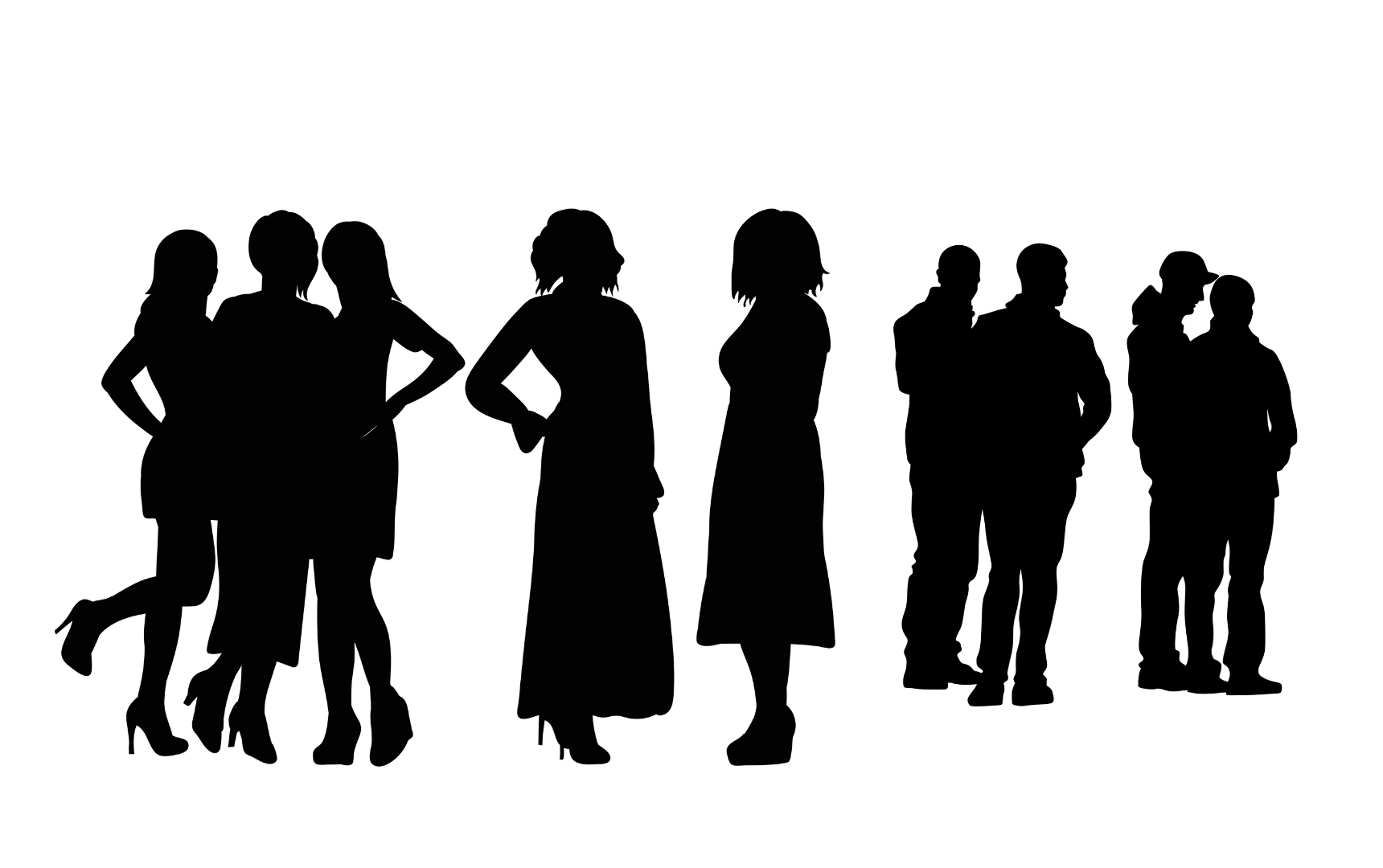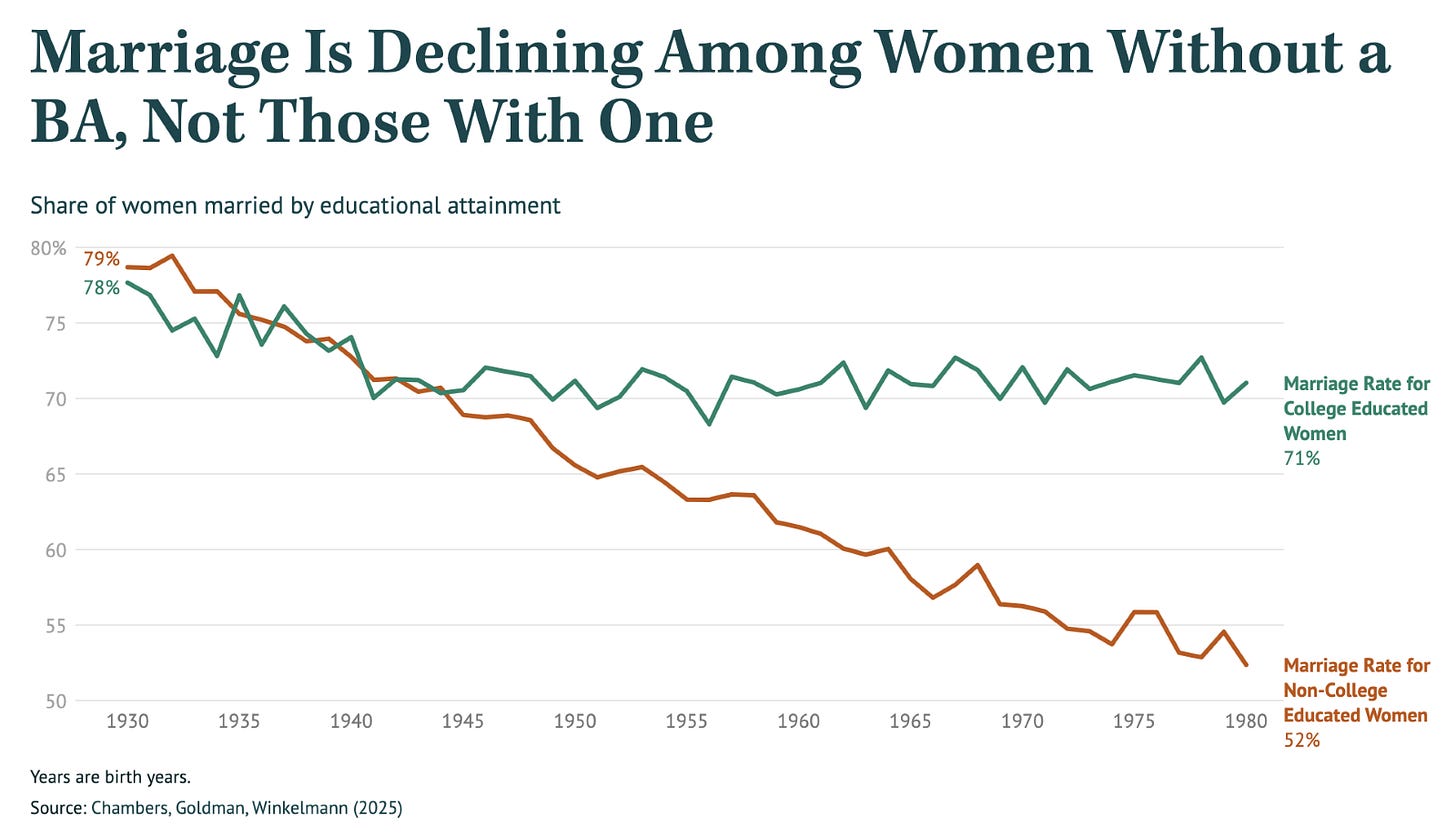Newsletter February 6, 2025
How Bad is America’s Romantic Recession?

One of the benefits of writing a book about relationships, dating and gender dynamics is that lots of people have opinions about these topics and share them freely. I recently received an email from a woman in her 40s who has given up on dating and men.
She gave me permission to share her email, although I will not use her actual name. “Cathy” is a 40-year-old financial analyst living in New England. She has a bachelor’s degree in French and German and is a self-described “linguaphile.” Her slate of hobbies includes bass guitar, astronomy, watercolor painting, reading, drawing, video games, and sewing. She has a full and active life.
When it comes to her dating life, however, things have not worked out as planned. Cathy writes:
“I’ve never had a boyfriend. I’ve never been in a long-term relationship. I’ve never lived with a man. I don’t have children. This wasn’t for lack of trying on my part. I’ve gone on dates with men, but they’ve never gelled into an actual relationship. When I was younger, I genuinely believed I would be married by my late-20s, or early 30s at the latest, and I was really surprised when it didn’t happen. I sort of feel like I’m in a state of limbo. I’m not really sure what I’m supposed to be doing right now because my life did not turn out like I envisioned. I just go through the motions. Go to work, chat with my friends, engage in my hobbies. Later, rinse, repeat. Currently what I’m trying to do is figure out my purpose now that I know a relationship with a man is off the table.
A lot of people have told me over the years that they were very surprised that I was single. I’ve gotten a lot of compliments from men and women alike on my appearance and people always say to me ‘You should have no problem getting a boyfriend.’ I know they usually mean it kindly – as in: ‘You’re too goo-looking to be single,’ but it also comes off as if you’re single, then it’s your fault, because there’s no reason why you should be, looking the way you do. Therefore, you must be picky.
I don’t feel that I am picky. I never felt that I’ve asked too much of men. All I wanted was a man I could take to and tell him about my day and he would tell me about his. Someone to eat dinner with on occasion. Maybe go to the movies. Someone I could be affectionate with. A boyfriend, basically.”
Cathy’s experience is not unique. The Pew Research Center found that a record number of 40-year-olds have never been married. Dating overall appears to be on the decline. I recently talked with two sorority sisters at the University of Virginia who are about to graduate without ever having been in a relationship. I asked them whether their freshman selves would be surprised by this fact. They both nodded. For college-educated young men, relationships and dating experiences are even more limited. Four in ten young men report having neither hooked up nor dated as undergraduates.
Do single women have unreasonably high expectations for a romantic partner? Or are men too inept or simply uninterested in dating? None of Cathy’s dating requirements sound unreasonable to me—especially given that she is an accomplished and educated woman. It’s true, however, that single, college-educated women have more specific preferences when it comes to a partner compared to women without a degree. For instance, being unemployed, smoking cigarettes, living with your parents, or supporting Trump are more likely to be dating red flags for college-educated women than those with less education.

But these dating preferences are not necessarily deal breakers. In conversation, plenty of single women express a willingness to accommodate and compromise. And even with these more specific preferences, college-educated women are far more likely to get married than their peers without degrees.
A fascinating new research paper, “Bachelors Without Bachelor’s: Gender Gaps in Education and Declining Marriage Rates,” by Clara Chambers, Benjamin Goldman, and Joseph Winkelmann finds that the marriage rate for college-educated women is not plummeting. Rather, it’s been remarkably stable. The authors find that just over seven in ten college-educated women are married. This is notable because the number of college-educated men available to marry is declining rapidly.
In their paper, the authors explain:
“College-educated women have sustained stable marriage rates by increasingly ‘marrying down’ in education, partnering with men without college degrees. However, this doesn’t equate to marrying men with poor economic prospects. While economic outcomes for men without college degrees have broadly declined … the subset of non-college men who marry college-educated women have stable or improving economic prospects. In contrast, the economic decline is concentrated among non-college men who remain unmarried to college-educated women, posing a growing challenge for the marriage prospects of non-college women.”
One critical takeaway from this research is that noncollege women face a deficit of marriageable men. This trend is almost certainly related to the dramatic decline in social connection and rising isolation of less educated Americans.
This certainly seems like good news for those with a college degree, but there are a couple of caveats. First, this data tells us nothing about the extent to which these couples are satisfied with their marriages or whether these marriages will endure. Second, and most critically, the data excludes Gen Z and most of the millennial generation.
There’s growing evidence Gen Z women are more suspicious of marriage than their parents. In a newly released report, Romantic Recession: How Politics, Pessimism, and Anxiety Shape American Courtship, we found that single women express considerable doubts about the benefits of marriage. Most single women believe they are happier than married women, but say married men are happier than their single counterparts. Other surveys show that very few young singles believe marriage is important to have a full and rewarding life.
Even fewer young adults are certain they want to become parents. Less than half of young women say they are certain they want children, while young men are somewhat more interested in parenthood.
At the same time, social norms supporting traditional marriage are weakening. Few young singles report feeling social pressure to get married from either their family or society. There is growing acceptance of a variety of different relationship types—including open marriages, which more than half of young adults support. And despite extensive research showing that kids raised by married parents do better, fewer Americans believe that it is important that they are.
Surveys also suggest the process of finding a partner has become grueling. Most people hate using dating apps, and an increasing number of singles believe they are unsafe. The steady accumulation of negative dating experiences has led some singles, like Cathy, to throw in the towel. She writes:
“What ultimately made me decide to stop dating was the realization that putting in a lot of effort into finding a man and not getting one was having a very negative impact on my mental health. I felt that there was something wrong with me that was causing men to treat me the way they did. … I felt like I had been studying for a test that I kept failing.
The other thing that made me decide to stop dating was that I realized I could get most of my needs met outside of dating. I fortunately have a good group of friends, so I still get to go out and have fun. I can call them up and ask to go to the movies instead. I also hang out with my sister a lot. I still have people to talk to who I know care about me.”
In many ways — perhaps most ways — Cathy lives a full and rewarding life, but she still struggles with a lack of physical affection. “I usually get touched maybe 2-3 times a year and that touch usually takes the form of a quick hug I might get from a friend when they greet me,” she writes.
More than anything, America’s romantic recession is a crisis of connection. It’s a cultural problem, and no amount of individual effort, lowering of standards, or changing personal expectations will solve it.
Read More on American Storylines









